- Quick Read
- Deep Read ( 8 Min. )

Why is Christian Science in our name?
Our name is about honesty. The Monitor is owned by The Christian Science Church, and we’ve always been transparent about that.
The Church publishes the Monitor because it sees good journalism as vital to progress in the world. Since 1908, we’ve aimed “to injure no man, but to bless all mankind,” as our founder, Mary Baker Eddy, put it.
Here, you’ll find award-winning journalism not driven by commercial influences – a news organization that takes seriously its mission to uplift the world by seeking solutions and finding reasons for credible hope.
Explore values journalism About usIn Today’s Issue
Monitor Daily Podcast
- Follow us:
- Apple Podcasts
- Spotify
- RSS Feed
- Download
TODAY’S INTRO
What African grey parrots and NFL players have in common
Today’s five selected stories cover Iowa's wake-up call for democracy, a values clash among anti-abortion Democrats, the true purpose of a Russian university, ingenuity driving clean energy, and our global survey of progress.
What do football players and African grey parrots have in common?
Altruism.
Let me explain. Researchers found that African grey parrots will voluntarily help another grey. In an experiment, the parrots could exchange tokens for nuts. If a neighboring parrot didn’t have a token, an African grey would see the need and voluntarily share its own token, says the study published in Current Biology last month. This happened even among parrots who were “strangers” to each other.
It’s the first time scientists have recorded voluntary generosity by an avian species. Other creatures have also challenged the Darwinian “survival of the fittest” view of nature as selfish. As my Monitor colleague has reported, Matabele ants have a tender side, caring for the wounds of other ants. In recent years, scientists have found cooperative and selfless instincts in mammals from rats to dolphins.
Many NFL players, who participate in one of the most violent and Darwinian of sports, are also models of compassion. Take Calais Campbell of the Jacksonville Jaguars, who was named the Walter Payton NFL Man of the Year winner for his community generosity. And there’s Kansas City Chiefs defensive lineman Derrick Nnadi. After his team won the Super Bowl Sunday, Mr. Nnadi said he would pay the fees for all 91 dogs (about $150 each) waiting to be adopted at a local shelter. Adoptions doubled overnight.
Birds of a feather: Football players and African grey parrots.
Share this article
Link copied.

Help fund Monitor journalism for $11/ month
Already a subscriber? Login

Monitor journalism changes lives because we open that too-small box that most people think they live in. We believe news can and should expand a sense of identity and possibility beyond narrow conventional expectations.
Our work isn't possible without your support.
Iowa caucus debacle a wake-up call for American democracy
The delay in caucus results – and doubts about their accuracy – have sown distrust in Iowa’s vaunted civic exercise. But the debacle may spur needed reforms in election security.
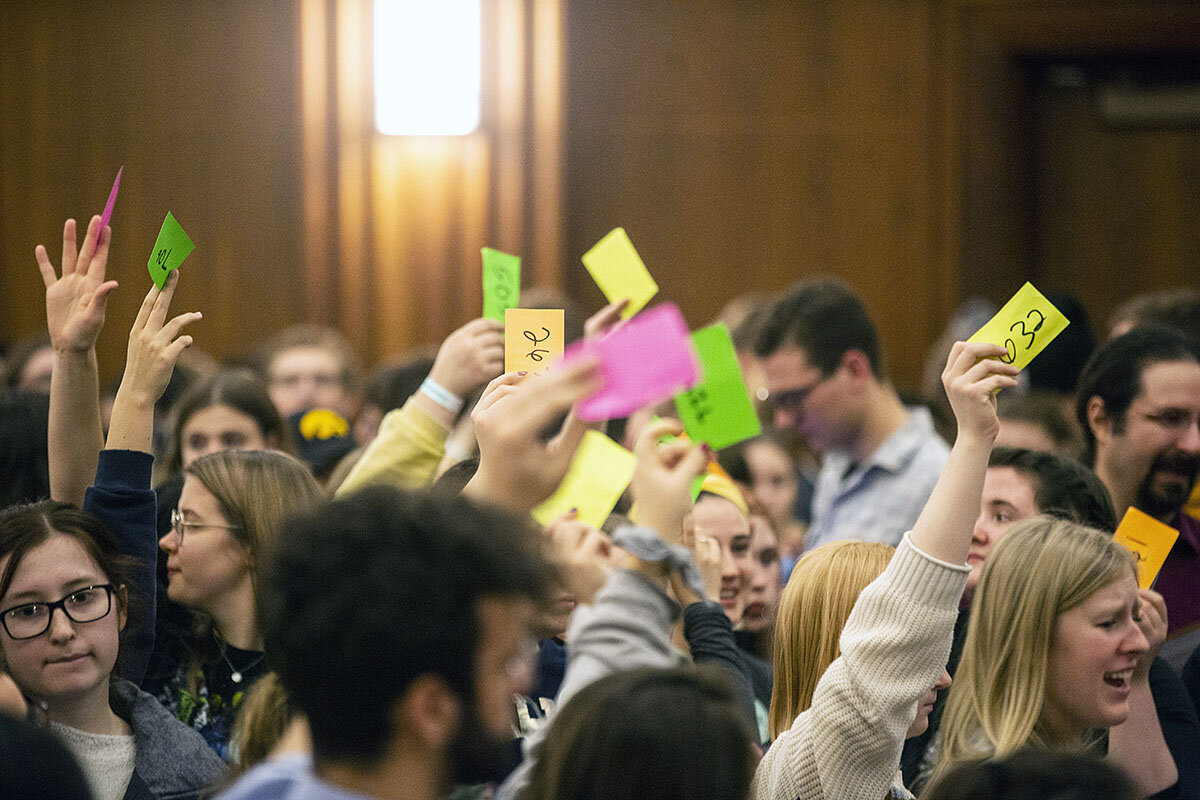
-
Christa Case Bryant Staff writer
Mary McAdams, a local Democratic Party chair outside Des Moines, wants the Iowa election results as much as anyone, and she is hopping mad that they’re not out yet. Her suburb of Ankeny, she says, ran 23 flawless precincts. “The only fly in the soup is this app,” she says, referring to the state Democratic Party’s new tool for tallying caucus results. “We did our job on the ground!”
In the first presidential nominating contest since Russian interference sowed doubt and distrust about the 2016 election, the Iowa caucus debacle has triggered a frenzy of national speculation about the integrity of results that will set the tone for this campaign season. It has not only called into serious question whether Iowa will be trusted to carry out the first-in-the-nation caucuses ever again, but has amplified concerns that have been building ever since the 2000 election, when Bush v. Gore raised questions about the accuracy and fairness of American election results.
However, Iowa’s botched caucuses could also galvanize all stakeholders to urgently address election vulnerabilities before November.
“What happened yesterday was a wake-up call,” says Richard Hasen, author of “Election Meltdown: Dirty Tricks, Distrust, and the Threat to American Democracy,” which is due out today. “We have nine months to make things better.”
Iowa caucus debacle a wake-up call for American democracy
Deborah West, dressed head to toe in yellow and blue, was giggling with excitement.
Pete Buttigieg, her preferred candidate, had just won the caucus in the 13th precinct of Ankeny, Iowa – at least, according to the projector at the front of the Marriott conference room.
“I’m just tickled that he did so well,” Ms. West said last night.
But that giddiness turned to confusion and then frustration, as it became clear overnight that state party leaders weren’t nearly so sure about the results, due in part to technical difficulties with a new app for tallying results.
“I woke up this morning thinking, ‘Oh dear, Iowa. What have you done?’” sighs Ms. West, who has been caucusing here for decades.
In the first presidential nominating contest since Russian interference sowed doubt and distrust about the 2016 election, the Iowa caucus debacle has triggered a frenzy of national speculation about the integrity of results that will set the tone for this campaign season. It has not only called into serious question whether Iowa will be trusted to carry out the first-in-the-nation caucuses ever again, but has amplified concerns that have been building ever since the 2000 election, when Bush v. Gore raised questions about the accuracy and fairness of American election results.
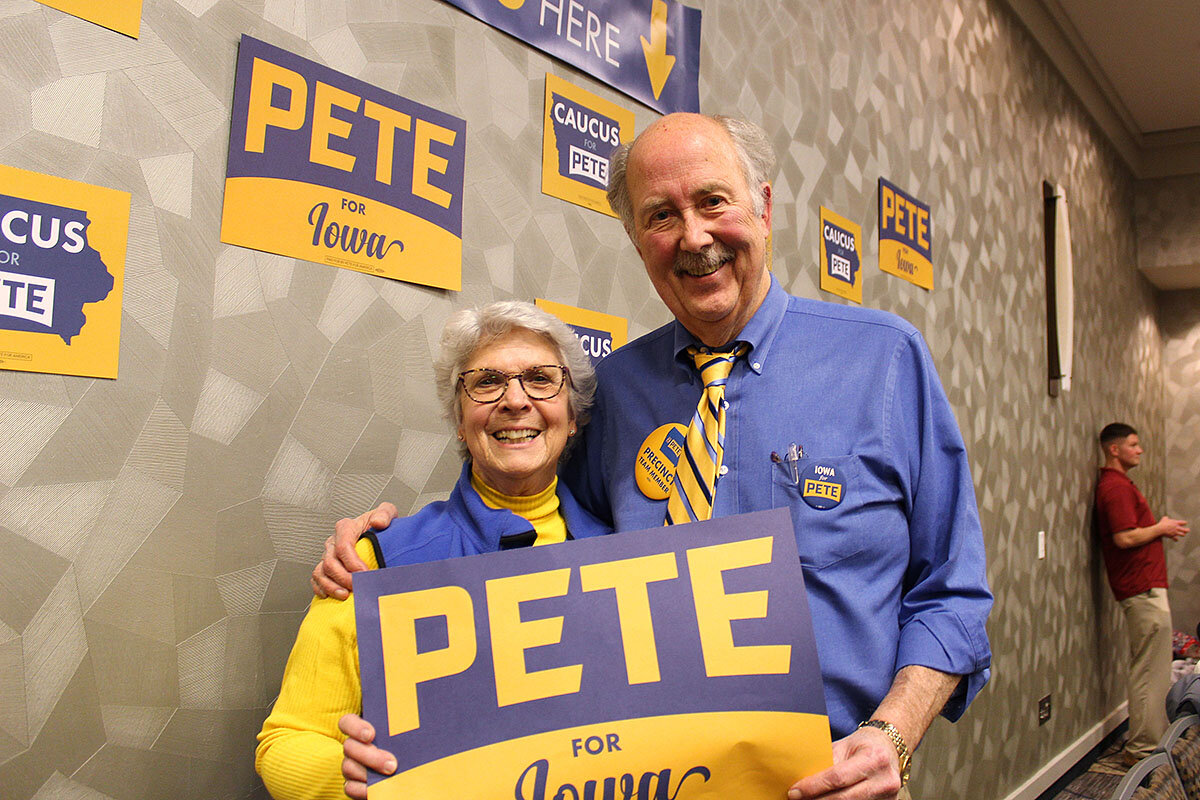
At issue is not only which candidate won, but how the nation will react to yet another high-profile challenge to the civic trust that is a pillar of any democratic society. But Iowa’s botched caucuses can also be seen as an opportunity, galvanizing everyone from local officials to the federal government to urgently address election vulnerabilities.
“This is a preview of the kind of things that could go wrong in November when the stakes will be higher and emotions will be hotter,” says Richard Hasen, author of “Election Meltdown: Dirty Tricks, Distrust, and the Threat to American Democracy,” which is out today. “What happened yesterday was a wake-up call. We have nine months to make things better.”
At 5 p.m. Tuesday, the Iowa Democratic party chair apologized and said officials “were going to take the time we need to verify the results.” With 62% of the precinct results, Mr. Buttigieg had a narrow lead with 27% of state delegate equivalents, with Sen. Bernie Sanders just behind with 25%. Sen. Elizabeth Warren placed third place at 18%, former Vice President Joe Biden got 16%, and Sen. Amy Klobuchar came in fifth.
To be sure, many aspects of the Iowa caucus were run flawlessly, and officials are cautioning against impatience and overreaction. But a decentralized electoral system is only as strong as its weakest link.
Experts say there are reforms states can make to ensure greater accuracy and security. At the same time, the media could do a better job combating misinformation when things go wrong, and educating voters about being patient rather than conditioning them to expect instant results. While it’s important to recognize signs of foreign meddling and other forms of fraud, it’s also crucial not to see boogeymen behind unintentional human error.
“Not every snafu is a rigging of election results, and we need to call out people who make such comments,” says Professor Hasen, who teaches law and political science at the University of California, Irvine. That said, he adds, “There are domestic and foreign forces who will try to make things worse for American democracy, and we need to make sure we remember we have a fragile system. It needs attention and it’s under attack.”
“We did our job on the ground!”
To Democratic leaders on the ground in Ankeny, a fast-growing suburb of Des Moines, last night’s caucus went better than ever in terms of organization.
Mary McAdams, chair of the Ankeny Area Democrats, says they ran 23 flawless precincts. “The only fly in the soup is this app,” she says, referring to the state Democratic Party’s new tool for tallying caucus results. “We did our job on the ground!”
Despite having nearly 50% more people turn out than in 2016, the check-in process was so seamless that many of the Ankeny caucuses were able to start right at 7 p.m., instead of taking up to an hour to register participants as usual. That was thanks in part to having more volunteers and better training.
So the caucus chairs of Ankeny’s 13th precinct, Kelsie Goodman and Megan Albaugh, both employees at the local high school, woke up surprised by this morning’s news trumpeting Iowa’s failure.
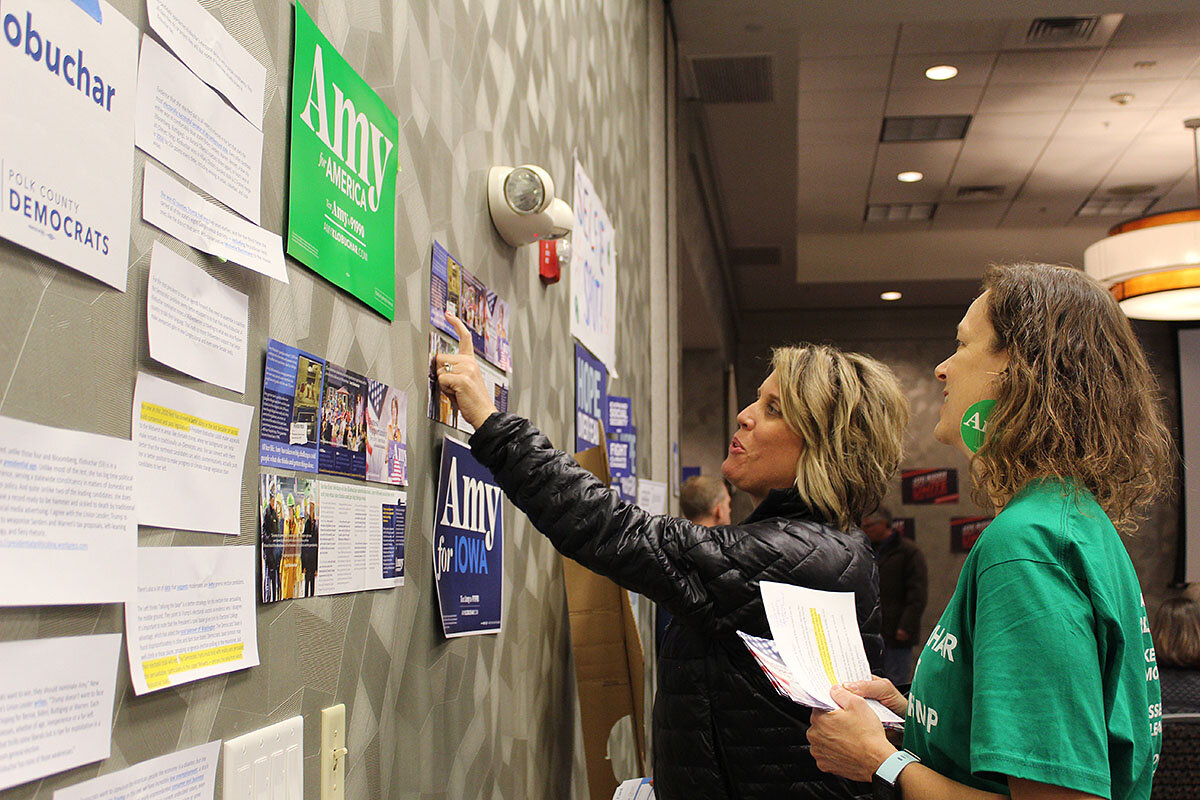
Ms. Albaugh said the app worked well and helped her do the math easily. Yes, she had a difficult time loading a photo of the spreadsheet they work on, but it was faster than doing it all by hand – especially given the two-inch-high stack of new registrants.
“We want to make sure all of our T’s are crossed and I’s are dotted,” says Ms. Albaugh. “Do you want accurate results or fast results?”
The Iowa Democratic Party revised its caucus rules and procedures this year as a result of complaints from people from the Bernie Sanders camp, who were angered by the lack of transparency in 2016. The app was supposed to help with the new way of tallying three different categories of results, but many people on the ground are frustrated that it was rolled out without adequate training and testing. Many local chairs reported having trouble using the app, and when they tried to call their results in, they were put on hold – sometimes for hours.
“I don’t understand why an untested app was introduced when we should have been more focused on building credibility and building faith in our process,” says Angie Hagerty, a Sanders ambassador for Ankeny’s 13th precinct.
She is especially concerned about how this has marred the caucuses in the eyes of young people and other first-time participants. Her college-aged daughter who caucused for Senator Sanders in Iowa City texted her asking, “Does my vote even count? The world is laughing at us.”
“I said, ‘Honey, you stood up for what you believed in, and you went and caucused. That’s what’s important.’”
Even before the delay and malfunction, many Democrats were up in arms about Iowa’s outsize influence on the election. Though it has a growing minority population, Iowa’s 91% white population is not reflective enough of the party’s diversity to warrant the weighty role it plays in winnowing the presidential field, critics contend.
Supporters counter that the state provides small, intimate spaces for the candidates to connect with voters and hone their message through retail politics. Iowans provide a perspective that moderates the extremes of the coasts, they say, and take seriously their civic responsibility.
“I’ve been taking my kids to the caucuses since they were babies in their car seats,” says Ms. Hagerty. “We’ve passed this tradition down to our kids.”
Now there are added questions of competence, however, which means the debate is likely to grow even louder before the next election cycle. Iowa Republicans are all too conscious of what this could mean for their own caucus in 2024.
“Iowa’s unique role encourages a grassroots nominating process that empowers everyday Americans, not Washington insiders or powerful billionaires,” wrote Sens. Chuck Grassley and Joni Ernst, together with Iowa Gov. Kim Reynolds, all Republicans. “The face-to-face retail politics nature of Iowa’s caucus system also encourages dialogue between candidates and voters that makes our presidential candidates accountable for the positions they take and the records they hold.”
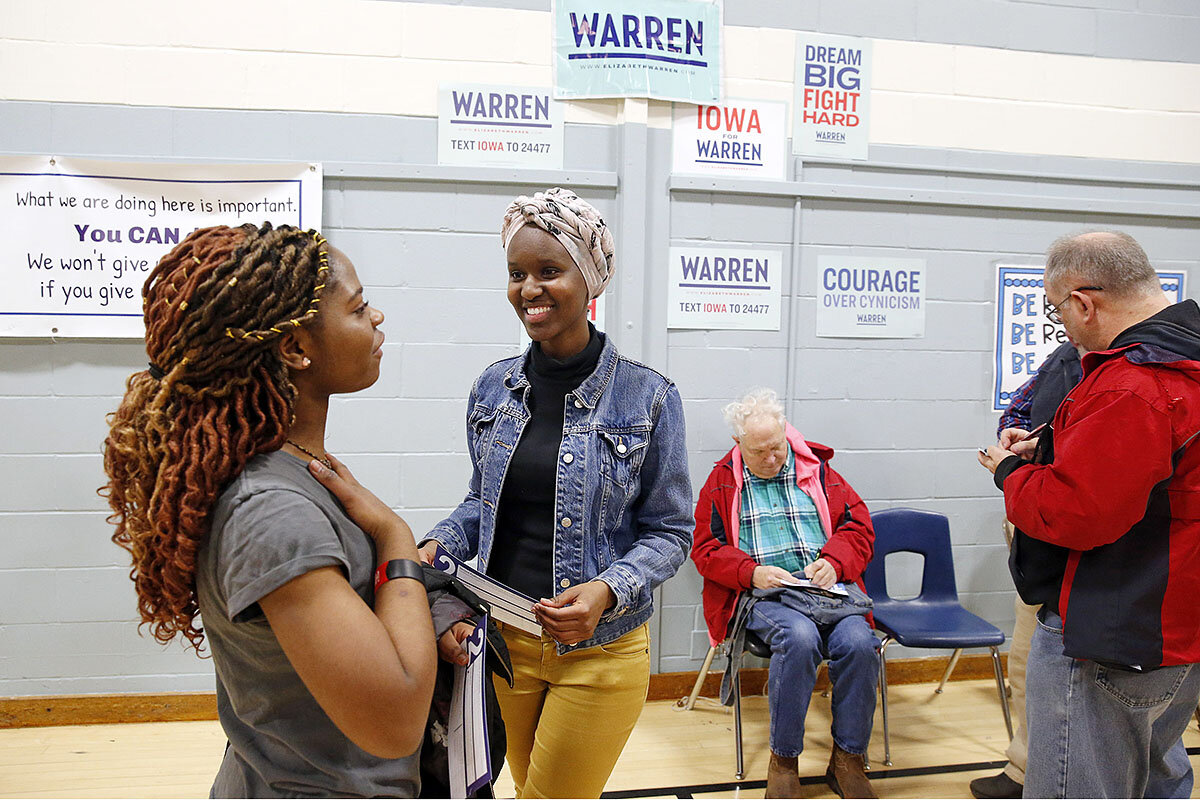
“The process is not suffering because of a short delay in knowing the final results,” they added.
Ms. West worries that the caucus mess will add to negative stereotypes of Iowans as a bunch of farmers and unsophisticated people.
“If it’s taken away, I will miss it,” she says. “It’s gotten people like me a lot more involved and interested. ... But maybe we can make it more fair for the whole country.”
Is this another crack in pillars of U.S. democracy?
After pouring millions of dollars into crisscrossing Iowa over the past year, in hopes of winning the first contest, which gives the front-runner crucial momentum and helps to winnow the field, candidates are facing the prospect that none of them may get that boost they were vying for.
They still came out last night before catching planes to New Hampshire, but without definitive data, their speeches ranged from vague to presumptive. Mr. Buttigieg was criticized in particular for essentially claiming victory without any official validation.
“We don’t know all the results,” he said. “But we know, by the time it’s all said and done, Iowa, you have shocked the nation, because by all indications, we are going on to New Hampshire victorious.”
Professor Hasen says the Iowa Democratic Party was not ready for prime time, and should have had much more extensive testing on their app and better training for those who were tabulating. Elections are hard to run well, and pockets of election administrator incompetence combined with places that are rolling out new rules or machines raise concerns.
There are also internet rumors, thus far unfounded, asking if Russia was behind these technological glitches.
Sen. Mark Warner, a Virginia Democrat who is co-chair of the Senate Cybersecurity Caucus, said in a statement that there’s no indication of malicious cyberactivity.
“But the continuing chaos in Iowa is illustrative of our overall failure to take sufficient steps to protect the integrity of our election systems,” he said, reiterating the need for a voter-verified paper trail as a backup to electronic election systems. Though all of Iowa’s nearly 1,700 precincts reportedly have a paper trail of caucus night, elsewhere in the country many local election administrators have no such backup in case the electronic voting machines malfunction. Democrats in Congress have been pushing for additional funding for paper ballots ahead of the November presidential election.
The vacuum of official results in Iowa has resulted in a swirl of misinformation, which is damaging to citizens’ trust in democratic processes. The president’s sons Donald Trump Jr. and Eric Trump are among those who have tweeted that the delay is due to the Iowa Democratic Party “rigging” the election.
“As we get further into the 2020 primaries, what happened in Iowa is an early warning sign that Congress, local officials, and the social media platform companies have much more work to do to ensure the integrity of our elections,” said Senator Warner.
“It’s pitiful,” agrees Ms. West. “I’m not a tech-y person, so I can’t point fingers, but my goodness. Somebody really dropped the ball.”
The lack of timely results has also dampened her enthusiasm for the apparent success of her favorite, Mr. Buttigieg.
“It takes all the bloom off the rose,” says Ms. West.

Looking past Roe
Can ‘pro-life Democrats’ still find a home in their party?
Can you be against abortion but for other liberal principles? Anti-abortion Democrats in Louisiana are testing the party’s “big tent” commitment by championing their religious beliefs.

- Quick Read
- Deep Read ( 10 Min. )
They appear to be among the most endangered political species in America. Only four are left in Congress. The very term – “pro-life Democrat” – sounds like an oxymoron, and their existence often triggers heated debate within their party.
Yet a case to be argued before the Supreme Court on March 4 shows their enduring power. At the heart of June Medical Services LLC v. Gee is Act 620, a measure written by a Democratic lawmaker from Louisiana and signed into law by that state’s Democratic governor. Act 620 requires doctors who provide abortions to gain legal permission to admit patients at a hospital within 30 miles of their abortion clinic.
If the high court finds the law constitutional, Louisiana will be left with only one abortion provider. The hearing, and the 2020 elections close behind, has brought new urgency to the tension over abortion within the Democratic Party.
Democrats against abortion say that a party that prides itself on diversity and inclusion should be able to reconcile support for women’s bodily autonomy with sincerely held religious beliefs about – or at least moral uncertainty over – the procedure. Abortion rights advocates argue that such a party cannot defend policies that prevent women from access to the full range of choices regarding their own bodies.
“We would never say, ‘We value the environment and clean air, but we welcome pro-coal people as a strength,’” says Pamela Merritt, a longtime liberal activist. “So why would we ever say it about abortion?”
Can ‘pro-life Democrats’ still find a home in their party?

At first glance, they appear to be among the most endangered political species in America. Only four are left in Congress. The very term – “pro-life Democrat” – sounds like an oxymoron. And their existence often triggers heated debate within their party, their position shunted to the side in ways they say they did not experience even a decade ago.
Yet a case to be argued before the U.S. Supreme Court on March 4 shows their enduring power. At the heart of June Medical Services LLC v. Gee is Act 620, a measure written by a Democratic lawmaker from Louisiana and signed into law by that state’s Democratic governor. Act 620 requires doctors who provide abortions to gain admitting privileges – or legal permission to admit patients – at a hospital within 30 miles of their abortion clinic.
If the high court finds the law constitutional, Louisiana will be left with only one abortion provider. It could also, critics say, set a standard that would all but remove the right to abortion access.
Which is what the law’s author, state Sen. Katrina Jackson, has advocated her whole career.
“I plan on standing with our attorney general to argue in favor of this law,” she said in a phone interview with the Monitor in 2019. “I will be taking calls from people, responding to emails, talking to my colleagues, posting on Facebook, Twitter, Instagram, and trying to encourage everyone to take the pro-life stance. It’s what I always do.”
Not long ago, Senator Jackson’s views would not have been too out of sync with her party’s. When the nonprofit Democrats for Life of America was founded in the early 2000s, it listed more than 40 members of Congress in its coalition. As recently as 2008, Hillary Clinton was campaigning on making abortion “safe, legal, and rare” – which still acknowledged, and tried to appeal to, Democratic voters who had moral doubts about the procedure.
As the ideological distance between the two parties have grown, however, the space for internal dissent on hot-button issues like abortion has shrunk. The GOP has unequivocally become the party against abortion. The Democratic Party, meanwhile, has had to wrestle with whether or not it can continue to make room for lawmakers like Ms. Jackson, who says she only splits with the platform on this one issue and has no desire to become a Republican.
Democrats against abortion say that a party that prides itself on diversity and inclusion should be able to reconcile support for women’s bodily autonomy with sincerely held religious beliefs about – or at least moral uncertainty over – the procedure. Abortion rights advocates argue that such a party cannot defend policies that prevent women – often poor, nonwhite women – from access to the full range of choices regarding their own bodies, including the decision of when and whether or not to parent.
Now, with June Medical on the docket and the 2020 elections fast on its heels, this intraparty tension has taken on new urgency. Progressive advocates say candidates must commit to fighting the wave of legal restrictions the procedure faces at the state and national levels, and recognize the socioeconomic and racial realities experienced by women seeking abortion. They’re convinced that those ideas are a cornerstone of the Democratic Party’s future, and that explaining them clearly to voters is a winning strategy.
Democrats for Life is pushing back hard. They’re recruiting candidates who are willing to both stand against abortion and advocate comprehensive supports for women – including policies around contraception and paid family leave. They argue that it’s about defending life “from womb to tomb,” a philosophy they say is consistent with Democratic positions on everything from the role of social safety net programs to minimum wage increases to the death penalty.
And they worry that by excluding abortion opponents from the party, national Democrats are alienating crucial swing voters in a pivotal election year.
“We’re supposed to be the big-tent party, so it’s mystifying to me that we’re really not,” says Kristen Day, executive director of Democrats for Life. “We’ve got to take the party back.”

The Missouri dispute
Perhaps nowhere has the Democratic conflict over abortion played out more clearly than in Missouri, a state once called a “barometer of the American middle.”
In 2018, former state legislator Joan Barry led an effort to insert language into the state Democratic Party platform asserting that its members “have sometimes different positions” on the issue. This diversity of views, the statement added, is “a strength.” The attempt triggered a furious debate over the party’s commitment to reproductive rights. It ended with members overwhelmingly voting down Ms. Barry’s proposal at a public meeting that summer.
The dispute left a bitter aftertaste. When the midterm elections took place a few months later, Missouri’s two-term Democratic senator Claire McCaskill lost her seat to conservative Republican Josh Hawley. State Democrats bickered over the reason: Some said it was partly because Senator McCaskill had publicly supported abortion rights. Others shot back that it was because she hadn’t defended them enough.
The thought of Democrats fighting among themselves over reproductive rights makes Pamela Merritt sigh over her cinnamon roll. The longtime liberal activist – who was a member of the platform reform committee during the 2018 dispute – maintains that Ms. Barry and her allies at Democrats for Life hijacked a year’s worth of difficult deliberations in order to foist a conservative agenda onto the party.
Isn’t it enough, she asks, that Missouri is one of the most abortion-restrictive states in the nation? As of January, state law requires women to wait 72 hours between mandatory in-person counseling and the actual procedure, parental consent for minors seeking an abortion, and an array of logistical standards that providers must meet before they are licensed to perform abortions. Only one abortion clinic has been active in Missouri since 2018.
“We would never say, ‘We value the environment and clean air, but we welcome pro-coal people as a strength,’” Ms. Merritt says over breakfast at a cafe in St. Louis’ Shaw neighborhood. “We would never say, ‘We value our LGBTQ party members but we welcome people who support conversion therapy as a strength.’ So why would we ever say it about abortion?”
In her view, Democrats need to give voters the opportunity to understand why the right to choose when to parent is crucial for women, for families, and for society. Do that, she says, and they will reward your trust. Ms. Merritt points to recent Democratic victories in Virginia, where in November the party took control of all three branches of the state government for the first time in a quarter-century. As part of the campaign, Planned Parenthood’s political arm in Virginia spent more than $1 million on candidates who supported abortion access. Abortion rights activists called it a victory for the cause.
Ms. Merritt chafes at Missouri Democrats’ reluctance to take a similar course. “Rather than learn how to talk about this and educate potential constituents … we’re just going to pretend like it’s not workable,” she says.
At her home in the suburbs just outside St. Louis, Ms. Barry, dressed in a lavender sweater and dark slacks, shakes her head.
Like many moderate Democrats, she holds the view that focusing on abortion could antagonize voters in relatively conservative places like Missouri. Abortion did flare briefly ahead of the 2018 midterms, during the controversial Senate confirmation of Justice Brett Kavanaugh to the Supreme Court. But it was kitchen-table issues like health care that energized voters in swing districts and won Democrats control of the U.S. House of Representatives that year – not abortion.
Why not try to sway voters with those issues, instead of pushing Democrats like her away?
“They think that everybody feels like them, and that’s not true,” Ms. Barry says of abortion rights advocates. “We should not be ostracized. We belong in there.”
A home for the movement?
Where Missouri is a battleground for Democrats for Life, Louisiana is about as close as its members have to a stronghold. The state’s brand of socially conscious religious conservatism is fertile ground for abortion opponents of all political stripes. More than half of Louisiana residents, including nearly 40% of Democrats, say abortion should be illegal in all or most cases, according to a 2016 survey. (Nationally, nearly two-thirds of Americans say abortion should be legal in all or most cases, with 76% of Democrats in agreement.)
The governor, John Bel Edwards, is one of the organization’s most prominent members.
In this environment, Ms. Jackson, the Democratic state senator, has bloomed into a star. Born and raised in Monroe, Louisiana – a city of about 48,000 – she grew up in a household that placed great store by duty to God and to community. Prayer and fasting mark her life milestones, including the decision to run for the state legislature in 2011. She hails from a family of Democrats, and feels strongly about her party’s commitment to defending the marginalized.
“They still fight for those who can’t fight for themselves,” she says.
She draws a hard line at abortion. To her, it’s unequivocal: Abortion is murder, and murder goes against God’s will. Over two terms as a state representative – she joined the Senate in 2019 – Ms. Jackson put her name to a slew of laws that have made headlines and drawn furious protests from abortion rights activists in Louisiana and nationwide.
Act 620, which passed in 2014, is among her crowning achievements.
“One of my best moments in the legislature was when this bill came up for final passage … and almost 80-some members, both Democrat and Republican, stood at the mic with me to pass this bill,” she says. “It showed a unity in the state of Louisiana that is not often seen.”
The experience also came with angry phone calls, nasty social media posts, even death threats that forced her to hire police to ensure the safety of her staff. But Ms. Jackson refuses to budge on the issue. “To the extent that the party is on the wrong side of an issue – and what I mean by the wrong side is that they veer away from the Christian faith – then I have to stand with God,” she says.
“That doesn’t mean that I don’t support the party,” she adds. “[But] I will not choose the party over God.”
Fighting for a place
To Ms. Day at Democrats for Life, Ms. Jackson is a model of leadership. “That’s exactly what we need at this point – someone who’s solidly pro-life,” she says. The group is actively recruiting state and local candidates to run in 2020, and raising funds to support their campaigns.
Existing members have also grown bolder. Illinois Rep. Dan Lipinski, one of the few members of Congress endorsed by the organization, co-signed an amicus brief at the start of the year that urged the Supreme Court to “revisit” Roe v. Wade, the 1973 ruling that legalized abortion, “and, if appropriate, overrule it.” The move prompted Chicago Mayor Lori Lightfoot to announce her bid to challenge Representative Lipinski in the 2020 primary, making her the third Democrat to do so.
Democrats for Life members have also gathered at the 2020 Democratic presidential primary debates in Atlanta, Los Angeles, Houston, and elsewhere, calling on candidates to publicly recognize their views.
Some have argued that if Democrats were committed to progressive principles, they would focus on coalition building and finding common spaces on difficult issues – like abortion. Jane Kleeb, a board member of the progressive nonprofit Our Revolution, compares the challenge to early efforts to stop the construction of the Keystone XL pipeline.
Climate change activists had led the charge against the project, crying out against potential risks to the environment. But the strength of the movement came from other stakeholders, who “came to work with us on that because of eminent domain, sovereign rights, water – all sorts of reasons,” says Ms. Kleeb, who is also chair of the Nebraska Democratic Party. “If I’d said to farmers and ranchers and tribal nations: ‘You can only come to the table and work with us if you’re against Keystone XL because of climate,’” she says, the coalition wouldn’t have been possible.
The Trump administration has since approved a right-of-way permit that would allow the pipeline to be built on U.S. lands, taking the project a step closer to reality despite activists’ efforts. Still, Ms. Kleeb says, the Democratic Party needs to think of abortion the same way.
“It’s [about] going to voters and saying, We may disagree on abortion and gun reform. Here are the 20 other areas we agree on,” she says. “You now have a choice. Do you stick with the party that agrees with you on those two issues, but completely abandoned you on these other 20?”

Democratic party officials and progressive activists play down the notion of a rift over abortion within the party. In an email, a spokeswoman for the Democratic National Committee affirmed the organization’s commitment to supporting women’s right to choose. The Missouri Democratic Party said in a separate statement that while it recognizes that Democrats hold a range of beliefs, “we can come together and support reproductive rights.”
Ms. Merritt in St. Louis dismisses Democrats for Life as a “messaging machine” that’s trying to drive a wedge between the Democratic Party and the abortion rights movement.
“People who try to advance reproductive oppression must be met, every single time they do it, with resistance,” she says.
And despite all the steps they’re taking ahead of 2020, Democrats who want the party to reverse itself on abortion have a steep climb ahead. Louisiana is an anomaly; nationwide, 82% of Democrats and Democratic-leaning voters say abortion should be legal in all or most cases, according to the Pew Research Center. Among party moderates, the figure dips a bit to 75%; among liberals, it surges to 91%.
Ms. Barry knows this. At a November meeting of the Oakville Democratic Organization in St. Louis County, where Ms. Barry serves as committeewoman, she gently asks the Monitor to avoid bringing up abortion. Later, she admits that her work on the platform hurt some of her relationships with other party members. “It’s still very sad to think that my party feels that everyone should be included, except someone who is pro-life,” she says.
“I believe in what the Democratic Party stands for,” she adds. “But I also believe that I need to be known as a member of that party.”
Staff writer Sarah Matusek contributed to this report from Oakville, Missouri.
Explore the entire Looking Past Roe series.

At Moscow university, a debate: Ban politics or risk the Kremlin's wrath?
What’s the role of a university? Russians consider the trade-offs of teaching civic responsibility versus protecting students and professors who criticize the Kremlin.
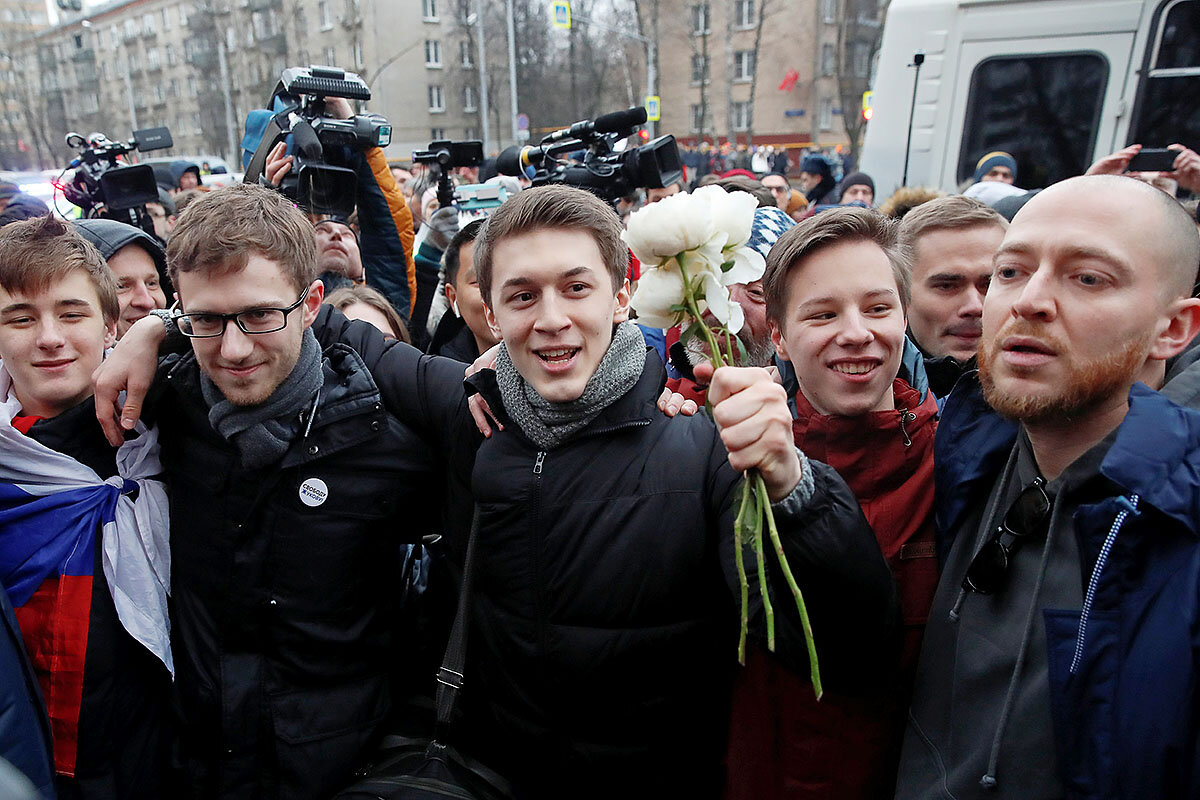
- Quick Read
- Deep Read ( 5 Min. )
Russia’s second-largest and most progressive state-funded university has become a flashpoint in the crackdown on open political speech in many schools across the country. Although the newly implemented restrictions at the Higher School of Economics in Moscow are not as draconian as they could be, the university administration’s transparency about the new rules has let the debate play out in public.
Protests against electoral manipulations by city authorities raged throughout downtown Moscow last summer, and brought the activism of some HSE students and staff to the attention of the public. Now Russia is heading into a period of potential political turmoil with a constitutional shake-up in the works.
In anticipation, HSE has banned explicit political activities on campus, defunded student media, and required that students and faculty who do engage in off-campus political activity disassociate themselves from the university.
“I understand that the administration wants to protect the university from accusations of politicization – which are particularly dangerous these days,” says Nikolai Svanidze, a well-known Russian commentator. “But, from a moral and educational point of view, how do you wean students from taking a position of civic responsibility? How do you prevent them from engaging in politics? Politics is life.”
At Moscow university, a debate: Ban politics or risk the Kremlin's wrath?
Russia’s second-largest and most progressive state-funded university is facing a dilemma.
On one hand, the Higher School of Economics (HSE), which has openly modeled itself on Western university traditions, generally espouses freedom of speech, and its spacious, modern downtown Moscow campuses are a known bastion of liberal moods. But as Russia heads into a period of potential political turmoil with a constitutional shake-up in the works, anything that looks like destabilizing political activity could bring the wrath of officialdom down upon the school.
So HSE has just enacted a controversial set of new rules to separate itself from the political arena. That includes banning explicit political activities on campus, defunding student media, demanding that students and faculty who do engage in off-campus political activity disassociate themselves from the university, and requiring faculty not to “exceed their expertise” in public statements as professors of the university.
It’s not as draconian as it could be. Indeed, by most accounts the crackdown on open political speech in many schools across Russia is far harsher. But HSE has become a flashpoint for debate on the subject. Ironically, it’s also partly because the university administration has been relatively transparent about the new rules.
“We absolutely have not imposed any repressive measures,” says Andrey Lavrov, Director of Public Relations for HSE. “The goal of these measures is to make the university a politically neutral place. In order for our students and staff to be fully involved in the search for scientific and academic truth, they must be free from any and all political pressures. Any student or staff member may be involved in outside political activities, but they must not identify with the university and must separate their political opinions from their academic views.
“We do not want any partisan political activities taking place in the university space,” he says, “that is all.”
A politically active campus
Although Mr. Lavrov denies any connection, the new rules come in the wake of serious political turbulence, which brought the activism of some HSE students and staff to the attention of the public – and the Kremlin. Mass protests against electoral manipulations by city authorities raged throughout downtown Moscow last summer, with some of the university’s students and faculty prominent among the demonstrators. Among those arrested amid the brutal police crackdown was a young HSE student, Yegor Zhukov, who had already gained some fame as an outspoken liberal vlogger on YouTube.
At his trial in December, Mr. Zhukov riveted politically minded Russians with a thoughtful but defiantly anti-Kremlin speech that went viral and was even reported by mainstream Russian media. He avoided jail time and returned to his studies in the political science department of HSE. But there had been on-campus protests in his defense that attracted a lot of attention, as well as open letters and petitions that gathered signatures of students and faculty.
“The HSE was one of the few universities in Russia where big protests occurred – including professors – and that presented the university administration with a dilemma,” says Masha Lipman, editor of Point & Counterpoint, a journal of Russian affairs published by George Washington University. “Do they protect the rights of students and faculty, or do they look after the university’s interests?
“The HSE has an international reputation. It attracts foreign students and faculty, encourages its staff to publish abroad, and they are different from other schools in that respect. But they are state-funded, and draw a lot of income from doing research for government bodies. So, the rector [Yaroslav Kuzminov] is basically caught between a rock and a hard place.”
Mr. Lavrov says there are no plans to expel Mr. Zhukov or punish him in any way for his off-campus political activities.
“Actually, we regard [Mr. Zhukov] as a good model for the policy we are trying to implement,” he says. “He is a student who carefully separates his political activities from his studies in the university. He does that wonderfully. The university supports him. Not because we agree with his views, but because he is our student and therefore is eligible for financial and legal support from the university.”
“Students are not happy”
Some students say the new rules are an acceptable compromise, while others remain opposed.
“On one hand I understand this decision as a necessary one by the university heads, but as a member of the student council I need to defend the rights of students,” says Nikita Bratukhin, a student council member. “And students are not happy about these new rules. People are particularly unhappy that student media might be shut down, and that human rights activities will no longer be allowed on campus. We used to be able to gather signatures in defense of political prisoners, for example, but that is forbidden now.”
One student publication, Doxa, was stripped of its status and defunded in December, after it published a critical article about the rector of another university. Doxa continues to publish a running commentary on its Facebook page but it is reportedly deprived of any right to use school space or facilities.
There are about seven active student media outlets at HSE, all of which have now been stripped of official status and deprived of funding, but it is unknown whether they will be denied the use of school premises and facilities. Some say the funding, about $250 annually, was never a very big deal. More important, they say, is the ability to involve students – particularly journalism students – in reporting and production, and not to suffer any interference or censorship from the administration.
“We have been stripped of our status as a student organization, but nobody knows what this really means,” says Anastasia Larionova, editor of the HSE’s oldest newspaper, The Vyshka. “At this point we really don’t know what’s in store for us. There is no pressure on us to change our content, even when it’s controversial. I think we’ll go on with our journalistic activity, and we’ll raise some money if we need to.”
“Politics is life”
Maria Matskevich, an expert with the Sociological Institute of the Russian Academy of Sciences in St. Petersburg, says there is no way of knowing how many students in schools around Russia may suffer more severe punishments, even expulsion, as a result of their political activities.
“Many higher educational institutes will regard the fact that a student has been detained by police, or fined by a court, as a violation of the university’s charter,” she says. “We may come to know about these cases when they happen in big centers like Moscow and St. Petersburg, but maybe not when it’s some lesser-known regional establishment.”
The HSE is trying to walk a very difficult and contradictory line, says Nikolai Svanidze, a professor of journalism at the Russian State University for the Humanities in Moscow and a well-known Russian historian and commentator.
“When students and professors defended Yegor Zhukov, they could not hide the fact that they were his colleagues at the HSE,” he says. “I understand that the administration wants to protect the university from accusations of politicization – which are particularly dangerous these days. But, from a moral and educational point of view, how do you wean students from taking a position of civic responsibility? How do you prevent them from engaging in politics? Politics is life.”

Solar and wind energy trounced the forecasts. Can they do it again?
Never underestimate the power of ingenuity unleashed. We look at why forecasts of renewable energy growth have been way too conservative.

Last year, for the first time, wind overtook coal as a power source in Texas. It lasted only a few months, but soon it may be the permanent reality. And it symbolizes major shifts underway beyond Texas.
The renewable energy industry’s growth has been consistently outpacing forecasts. In 2000, the U.S. Energy Information Administration (EIA) predicted the nation would generate 15 billion kilowatt hours of electricity from wind and solar in 2020. The actual amount today is already 33 times that amount, with nonhydro renewables making up about 12% of total U.S. power generation.
“There was a lot of policy that happened between 2000 and 2020,” says Christopher Namovicz, an analyst at the EIA. “Costs have come down because a number of states started implementing renewable portfolio standards, the federal government continued to renew its tax credits,” and international markets have spurred technological development.
Such circumstances would need to continue – particularly in the solar and wind industries – for renewables to beat their current projections for 2050. Is that possible? Even to industry insiders that’s unclear, says Mr. Namovicz.
“I remember going to a conference years ago with somebody from the solar industry who said, ‘Every year internally we look at what costs are and say, oh, costs have got to bottom out at some point and they can’t really go much further.’ And then next year, they’re down even lower.” – Timmy Broderick, staff writer
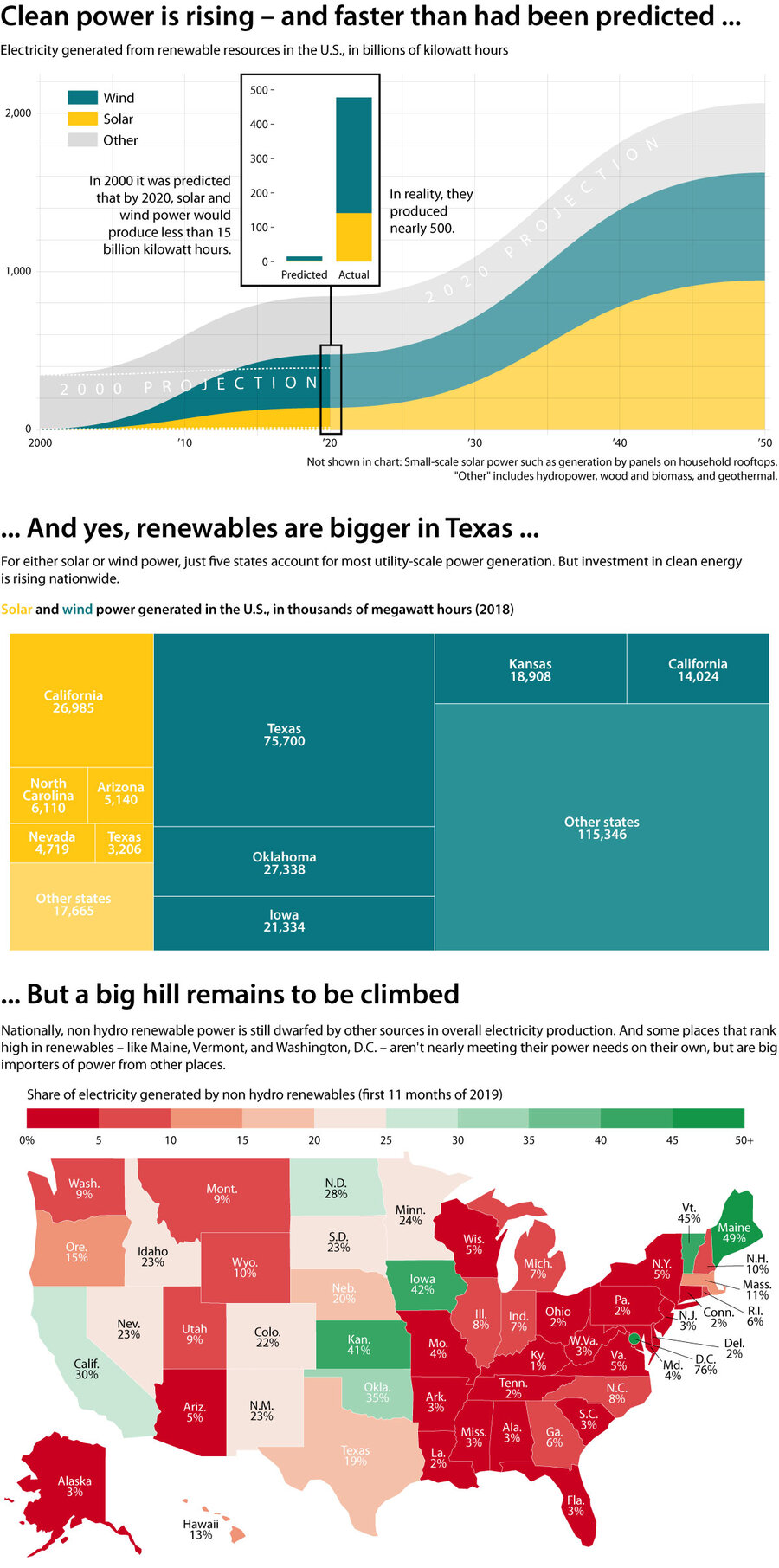
US Energy Information Administration

Points of Progress
The city with zero pedestrian deaths
Our global progress survey marks a leadership shift as women become pro baseball coaches, Norway takes a novel approach to safer streets, and the world’s biggest producer of plastic waste takes a big step toward caring for the planet.
The city with zero pedestrian deaths
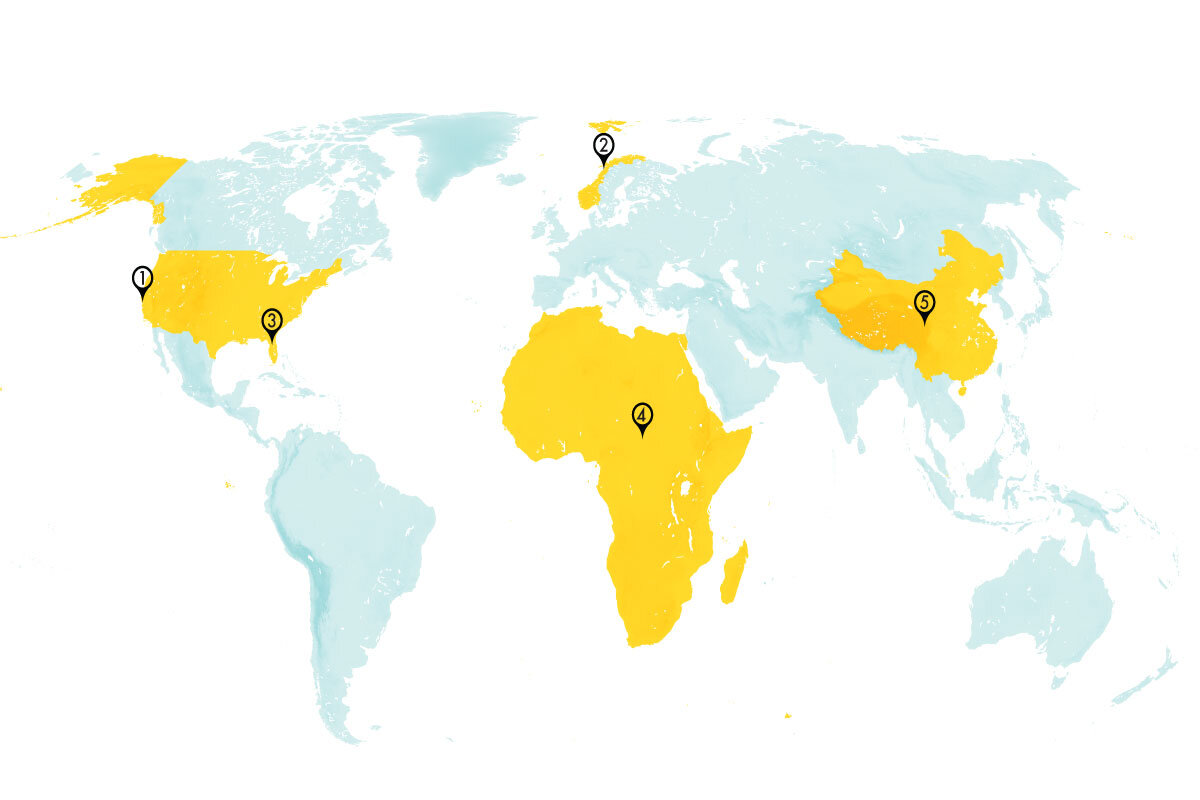
1. California
Alyssa Nakken became the first full-time female coach in Major League Baseball after being hired as an assistant by the San Francisco Giants in January. A former college softball player, Ms. Nakken will help coordinate health and wellness programming while traveling with the team. “Simply, I think she’s going to be a great coach,” said manager Gabe Kapler. “Merit and the ability to be a great coach trumps all.” Ms. Nakken’s hire follows the New York Yankees’ November hiring of Rachel Balkovec as a hitting coach for their minor league team – making her the first full-time female hitting coach hired in professional baseball. (ESPN)
2. Norway

Norway’s bike-friendly capital of Oslo is on the brink of achieving a safe and equitable transit system goal, after recording zero pedestrian or cyclist deaths in 2019. The reduction, down from five deaths in 2018, is largely the result of a 2015 plan to reduce the number of cars on the road and promote cycling, foot traffic, and public transit in Oslo’s car-free city center, advocates say. The country as a whole already has some of the safest roads in the world, making its nearly 50% reduction in traffic fatalities between 2010 and 2017 more impressive, according to the International Transport Forum’s 2019 road safety report. (Smart Cities Dive)
3. Florida
Florida’s Department of Environmental Protection will acquire 20,000 acres of wetlands in the Everglades to protect it after a court ruled the former owner, a real estate firm, could drill for oil on the land. Announced in a press release from Republican Gov. Ron DeSantis’ office, the wetland acquisition is said to be the largest in a decade and could help protect more than 60 endangered and threatened species. Environmental groups praised the decision by Governor DeSantis, who has made preserving the Everglades one of his top environmental priorities since announcing a four year, $2.5 billion spending plan to preserve the ecosystem in 2019. The purchase comes as some Republican governors in coastal states begin to resist efforts by the White House to loosen regulations on offshore drilling. (CNN)
4. Africa
Nigeria marked three years without a polio case, meaning Africa could be declared polio-free as early as this year. The progress follows what Dr. Matshidiso Moeti, the World Health Organization’s regional director for Africa, called a “monumental effort” of health workers across Nigeria, which in 2012 had 200 reported cases of the disease. “We are confident that soon we will be trumpeting the certification that countries have, once and for all, kicked polio out of Africa,” said Dr. Moeti. If the continent is indeed declared polio-free, then Pakistan and Afghanistan will be the last major countries where the disease is endemic. (The Guardian)
5. China

China is banning plastic bags in all major cities by the end of this year and in all cities and towns by the end of 2022, according to a new policy from the National Development and Reform Commission and the Ministry of Ecology and Environment. The ban comes as China, perhaps the largest producer of plastic waste in the world, attempts to significantly reduce its reliance on single-use plastics. Other items, such as plastic straws, will also be phased out in the restaurant industry, which faces a five-year deadline to reduce its plastic use by 30%. Fresh produce markets, meanwhile, will be exempt from the bans until 2025. (Reuters)
Worldwide
New findings from researchers at the University of Washington contradict the popular belief that fisheries around the world are declining. Around half the fish caught worldwide, the report says, come from stocks that are monitored and increasing in abundance. Adding to a decade of work and international cooperation, the research project identifies effective fishery management as the most important tool in maintaining healthy fish stocks – even as large gaps in the data remain. “There is a narrative that fish stocks are declining around the world, that fisheries management is failing and we need new solutions – and it’s totally wrong,” says lead author Ray Hilborn, a professor at the University of Washington’s School of Aquatic and Fishery Sciences. (University of Washington)
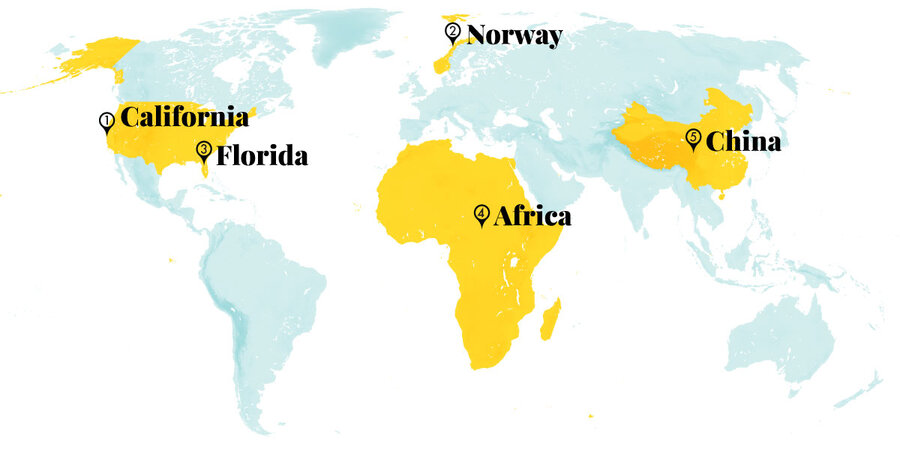
Other headline stories we’re watching
(Get live updates throughout the day.)The Monitor's View
Mercy flights as harbingers of peace
- Quick Read
- Deep Read ( 2 Min. )
-
By the Monitor's Editorial Board
In wars or disasters, a turning point often occurs when civilians are rescued. Such was the case Monday in war-wracked Yemen when a United Nations “mercy flight” evacuated seven ill people to Jordan for treatment. The humanitarian airlift was the first in three years. It marks a new recognition by the war’s combatants of a shared interest in saving lives.
More mercy flights are expected in coming days, a result of diplomatic efforts to end a five-year war that has killed more than 100,000 people.
Saving civilians in places of trouble builds trust between opponents, which then allows for negotiated settlements. In other hot spots, such as Syria and Libya, U.N. officials are trying to open or maintain “humanitarian corridors” for civilians to keep them safe or to deliver supplies. In disaster zones, too, rescue efforts often bring foes together, even if for a short time.
The recognition of the innocence of civilians in a conflict area is a powerful concept for peace. When a war zone like Yemen sees the idea in action, it is a moment to celebrate. It means saving lives is becoming more important than killing foes.
Mercy flights as harbingers of peace
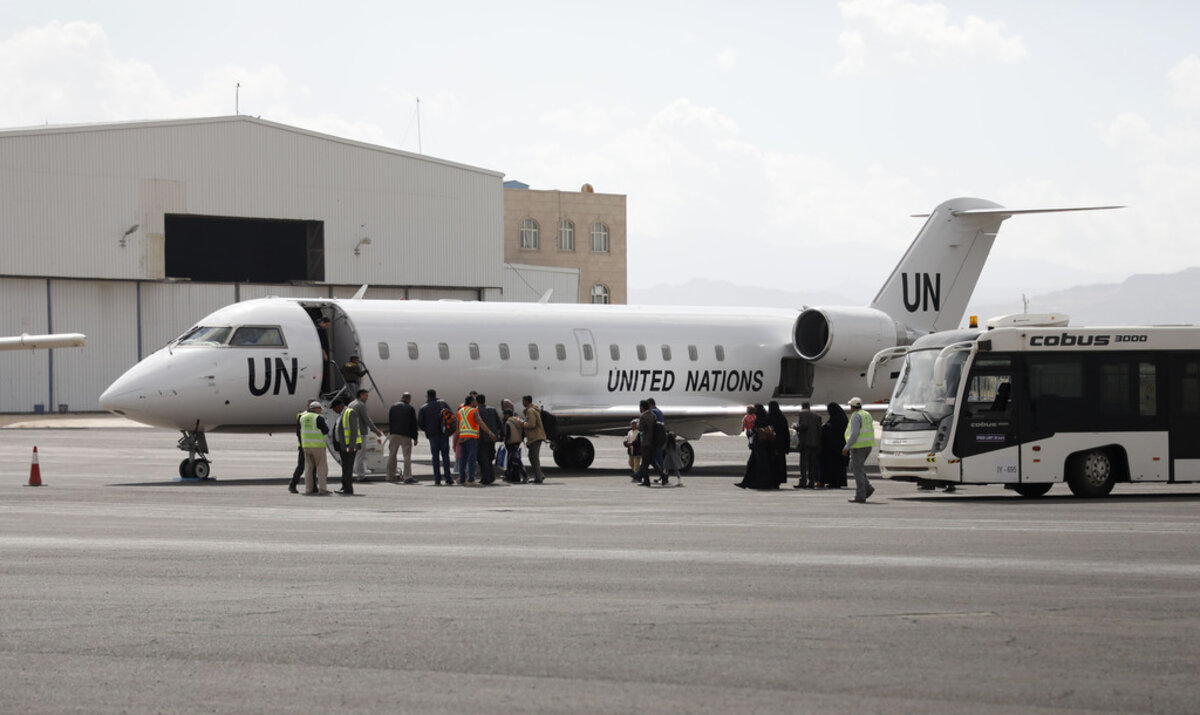
In wars or disasters, a turning point often occurs when civilians are rescued. Such was the case Monday in war-wracked Yemen when a United Nations “mercy flight” evacuated seven ill people to Jordan for treatment. The humanitarian airlift was the first in three years, ending a blockade of the airport in the capital by Saudi Arabia. It marks a new recognition by the war’s combatants of a shared interest in saving lives.
More mercy flights are expected in coming days, a result of diplomatic efforts to end a five-year war that has killed more than 100,000 people. The rescue offers hope that all sides in the war might finally be honoring international humanitarian law, a starting point for eventual peace.
Saving civilians in places of trouble builds trust between opponents, which then allows for negotiated settlements. In other hot spots, such as Syria and Libya, U.N. officials are trying to open or maintain “humanitarian corridors” for civilians to keep them safe or to deliver supplies. In disaster zones, too, rescue efforts often bring foes together, even if for a short time.
In China, for example, the virus outbreak has forced Beijing to work with Taiwan to airlift Taiwanese living in the affected area of Hubei province. After 247 people were airlifted Monday, Taiwanese President Tsai Ing-wen expressed thanks to China on her Facebook page. “Although the two sides of the Taiwan Strait have different political stances, in the face of the virus human rights and humanitarianism should be put before political considerations,” she wrote.
The idea that neutral aid workers must be free to help people in jeopardy is still not widely accepted in many parts of the world. The concept was born in 19th-century Europe and later embodied in the Geneva Conventions. The International Committee of the Red Cross is the lead agency trying to assist both states and nonstate actors to accept humanitarian law.
The recognition of the innocence of civilians in a conflict area is a powerful concept for peace. When a war zone like Yemen sees the idea in action, it is a moment to celebrate. It means saving lives is becoming more important than killing foes.

A Christian Science Perspective
Each weekday, the Monitor includes one clearly labeled religious article offering spiritual insight on contemporary issues, including the news. The publication – in its various forms – is produced for anyone who cares about the progress of the human endeavor around the world and seeks news reported with compassion, intelligence, and an essentially constructive lens. For many, that caring has religious roots. For many, it does not. The Monitor has always embraced both audiences. The Monitor is owned by a church – The First Church of Christ, Scientist, in Boston – whose founder was concerned with both the state of the world and the quality of available news.
‘Now what?’
- Quick Read
- Read or Listen ( 3 Min. )
-
By Andrea McCormick
Sometimes it can feel as if we’re surrounded by an insurmountable problem. But looking at things through a spiritual lens, rather than being consumed by the problem, empowers us to witness the presence and care of God always surrounding us.
‘Now what?’
The Bible tells a story of the Syrian army surrounding the city of Dothan in order to capture the prophet Elisha. In desperation, his servant asked, in effect, “Now what?” Their demise seemed imminent.
Elisha’s response was surprising: “‘Don’t be afraid,’ the prophet answered. ‘Those who are with us are more than those who are with them.’ And Elisha prayed, ‘Open his eyes, Lord, so that he may see.’ Then the Lord opened the servant’s eyes, and he looked and saw the hills full of horses and chariots of fire all around Elisha” (II Kings 6:16, 17, New International Version). Not only were they saved, but Elisha went on to spare his captured enemies as well.
Elisha’s profound answer taught me a great lesson. I’ve never been surrounded by a literal army, but the idea that God’s angels are always surrounding us has helped me many times throughout my life.
Some years ago, I was involved with a complex building project in New York City. Not long into the project, conflict arose between the various parties involved, which made every meeting contentious and unproductive. On top of that, it looked as if the project was going to end up significantly in the hole financially.
I felt surrounded by an insurmountable problem. But I knew that God sends all of us “angels,” or messages of deliverance, which bring needed wisdom and light when we’re willing to look with the spiritual sense we each inherently have rather than simply accepting what we see with our eyes. There had been times when I needed money, a job, companionship, or better health and had experienced firsthand the healing impact of this spiritual sense – of thinking differently, from a spiritual standpoint, about a situation.
The Greek word used for “repent” in the Bible means “to think differently” (“Strong’s Exhaustive Concordance of the Bible”). Jesus used the word often in his ministry. For instance, he urged followers to “repent: for the kingdom of heaven is at hand” (Matthew 4:17). “Science and Health with Key to the Scriptures” by Mary Baker Eddy, the discoverer of Christian Science, defines “Kingdom of Heaven” as “the reign of harmony in divine Science; the realm of unerring, eternal, and omnipotent Mind...” (p. 590).
Turning to the one divine Mind, God, as our true source of supply, health, harmony, and wisdom overcomes the sense of having to rely on a limited personal mind and paves the way for outcomes we may never have imagined were possible. Science and Health explains, “The rays of infinite Truth, when gathered into the focus of ideas, bring light instantaneously, whereas a thousand years of human doctrines, hypotheses, and vague conjectures emit no such effulgence” (p. 504). The power of God is greater than whatever an enemy, or problem, may seem to be, because God is actually infinite. Acknowledging this enlightens us about the spiritual reality of God’s presence and harmony. This light enables us to see the way forward.
So instead of ruminating on the problem, I prayed, asking God how I could best glorify Him in this situation. I strove to see those involved with the project in the light of their true, spiritual identity as God’s children: trustworthy, dedicated, worthy of respect. These prayers led me to find a new party to bring into the project. This person understood immediately our desire for trust and a spirit of cooperation. Not only were these qualities introduced into the project as a result of this change, but the developer offered to help us with financial concessions in the exact amount needed to complete the project on budget.
It was hard not to feel awed; this was an even greater outcome than I had ever expected. To me it showed the value of “opening our eyes” – relying on our innate spiritual sense, which reveals God’s reality – rather than becoming consumed by a problem. This empowers us to witness the presence of God, divine Love, that’s always surrounding us and everyone.
These verses from the “Christian Science Hymnal” sum it up perfectly:
In atmosphere of Love divine,
We live, and move, and breathe;
Though mortal eyes may see it not,
’Tis sense that would deceive.The mortal sense we must destroy,
If we would bring to light
The wonders of eternal Mind,
Where sense is lost in sight.
(No. 144, adapt. © CSBD)

A message of love
Where time stood still
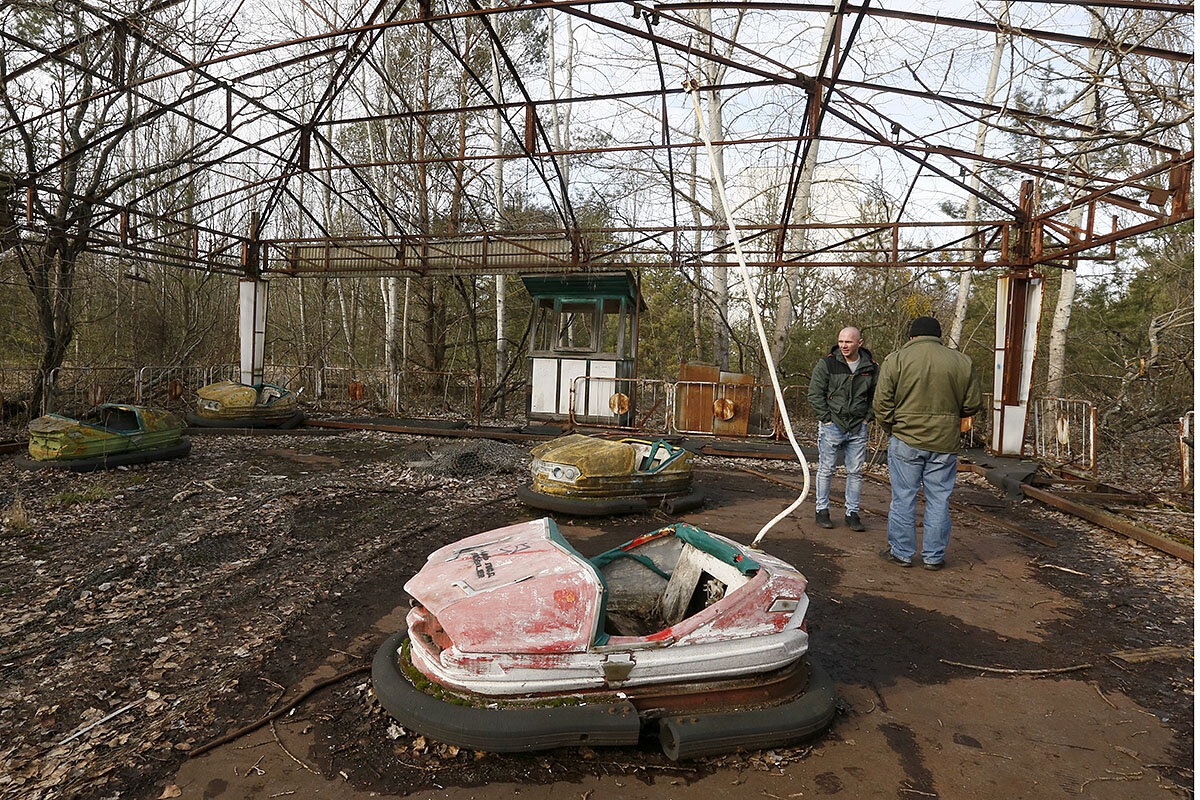
A look ahead
Thanks for joining us. Come back tomorrow: We’re working on a story about how Estonia foils Russian cyberinterference.



